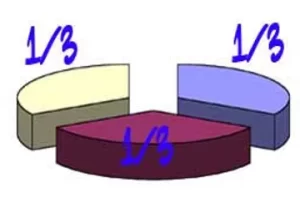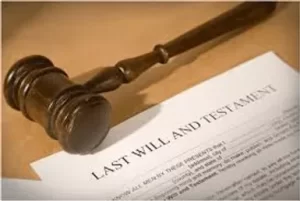
Not only is a Will necessary, but if you have assets in Spain AND the UK I’m going to explain why I recommend you make a UK Will AND a Spanish Will.
People often make the mistake of thinking that their assets will be easy to deal with for their loved ones when they have passed, especially if they deem their finances and assets to be quite straight forward. What people don’t often consider is that every bank account, car, property, pension, savings account and investment will all need to be either closed or passed to the correct beneficiary, and dying without a Will can take away your choices, compounded if you are not married or in a civil partnership.
Dying without a Will – England and Wales
Estate worth under £270,000 – In England and Wales, should you die without a Will (known as intestate) and are married, your spouse or civil partner gets all of the estate if it’s worth less than £270,000.
Estate worth more than £270,000 – Your spouse or civil partner keeps all the assets (including property), up to £270,000, and all the personal possessions, whatever their value.
The remainder of the estate will be shared as follows:
– the husband, wife or civil partner gets an absolute interest in half of the remainder (this means they will own that half outright)
– the other half is then divided equally between the surviving children. If a son or daughter has died before the deceased died, their children will inherit in their place.
If you are not married or in a civil partnership the estate is shared equally between the children or their descendants.
Dying without a Will – Scotland
In Scotland your spouse or civil partner gets the house up to a value of £473,000. They’ll get a lump sum of £473,000 if the house is worth more, and may have to sell off the property.
They also get:
– furniture and moveable household goods up to the value of £29,000
– up to £50,000 in cash
– a third of the rest of the estate
– the children will get two-thirds of the rest of the estate. If a son or daughter has already died, their children (the grandchildren of the deceased) will inherit in their place.
If not married or in a civil partnership the estate is shared equally between the children or their descendants.
Dying without a Will – Spain
If a foreign owner of property in Spain dies without making a Will, in Spain or anywhere, whether resident or not, there is no dispute – their property will be disposed of in accordance with Spanish inheritance rules.
In some areas, Spanish Notaries can request to make the Intestacy in the UK first, and then, to execute the order in Spain. It means that the eventual inheritors, must go to the UK, make the intestacy there, and, once obtained, bring it to Spain to execute it over the Spanish assets.
In other cases, if the Spanish Notary knows the British Intestacy system, it is not necessary to make the Intestacy in the UK.
What are Spanish Inheritance Rules?
The Spanish have “Compulsory” or “Obligatory Beneficiaries” (Herederos Forzosos), which means that the testator cannot dispose of the full inheritance freely. In order to protect the family and provide for the children, Spanish inheritance laws restrict the testator’s freedom to leave property to anyone they please. Spanish law requires a parent to leave two-thirds of the estate to children, even bypassing the surviving spouse.
In Spanish law, a surviving spouse keeps half of the goods acquired during marriage, and all personal gifts or inheritances which have come directly to this spouse. Of the rest of the assets, only one-third can be freely disposed of.

When a person dies leaving children, the estate is divided into three equal parts.
– One of these thirds must be left to the children in equal parts,
– another third must also be left to the children but the testator may decide how to divide it (a surviving spouse has a life interest in this third – the surviving spouse is able to use this third for the rest of their life, but never owns the asset itself.
– The final third of the estate can be freely willed to anyone the testator chooses.
This is totally different from the UK Inheritance law which allows for the disposal of assets with total freedom and at the entire wish of the person (but only if you have made a Will!!!) Imagine how much more complex this becomes if you happen to be on your second marriage and there are step children involved!
UK or Spanish Will?
Once the decision is made to make a Will it may at first sight seem easier if this Will was made in the UK. But there are several problems with this. First of all, you can only make a UK Will if you are still regarded as officially domiciled in the UK. Domicile is usually very difficult to change, so this should normally not be a problem. But a person who has lived for most of their life in Spain, has severed all ties with the UK, has no assets or income in the UK, has truly made Spain their permanent and only home, and has no plans to return to the UK in old age, is likely to be regarded as domiciled in Spain, and may have a problem in making a valid UK Will. But “domicile” is a general law concept, so is not strictly defined, and this is certainly an area which needs specialist legal advice.
Second, in order to legalise a UK Will for Spain and be able to execute it (to be able to transfer the property ownership, make a new escritura, register the change, and eventually sell it), there are several steps that must be taken:
1. A certified copy of the grant of probate must be legalised by the Spanish Consul in the UK.
2. A Spanish translation of this certified copy must be prepared and validated by the Consul.
3. A Spanish lawyer must be empowered to prepare a list of the assets in Spain, and to execute the Will, and pay the inheritance taxes.
4. The Spanish Consul must prepare a certificado de ley (certificate of legal compliance), which confirms that the testator had the legal capacity to make a Will, that the Will is valid, that the Spanish Law of Obligatory Beneficiaries does not exist in the UK, that the Will has been duly proven and that the trustees named have the legal powers to administer the estate. It declares your Will effective to be executed in Spain, and authorises your lawyer to carry this out.

Due to the complicated process involved to execute a foreign Will in Spain, as per the above mentioned steps, and expenses, I recommend that you make a Spanish Will in Spain to cover your Spanish assets and also a UK Will to cover your UK assets. It will save your inheritors time, money and stress, ensuring that your assets are distributed as per your wishes.
However, care should be taken when each Will is written to ensure that one does not cancel the other! Take professional advice, preferably from a UK Solicitor based in Spain who is also a qualified Spanish Abogado. This will ensure that both Wills are written in the best way for you as an expat!
The above article was kindly provided by Andrea Speed from Speed Financial Solutions and originally posted at: https://www.speedfinancialsolutions.com/post/why-is-a-will-necessary
